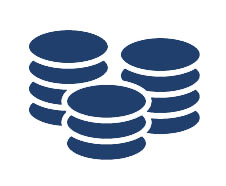Application deadline:Fall Semester (which starts each year in September): 31 May (31 March for applicants who require support with visa applications)Spring Semester (which starts each year in February): 15 November (30 September for applicants who require support with visa applications) |
Enrolment
 For further information, please consult our list of Frequently Asked Questions (FAQs) ⤵
For further information, please consult our list of Frequently Asked Questions (FAQs) ⤵
|
Each application is evaluated on an individual basis by the admissions panel.
Applicants must ensure they meet Swiss student visa requirements if applicable.
Please note: students must present their original degree certificates and transcripts to the Registrar's Office upon arrival at the University of Lausanne. |
Entry Academic Qualifications
Candidates eligible for admission to the LL.M. must:
1. meet the admissions criteria set by UNIL,
2. and
a) hold a Master of Law (MLaw) from a Swiss university or an equivalent university degree, as determined by the Admissions Office on the basis of documents presented, or
b) hold a Bachelor of Law (BLaw) from a Swiss university or an equivalent university degree, as determined by the Admissions Office on the basis of documents presented, and meet one of the following, additional conditions, deemed sufficient by the Programme Directors:
i. they are able to demonstrate additional relevant training (minimum 60 ECTS credits), or
ii. they are able to demonstrate relevant professional experience (minimum 12 months).
Evidence of English language proficiency for non-native speakers
Non-native speakers must demonstrate proficiency in the English language (level B2 of the Common European Reference Framework for Languages).
Application material*:
- a letter of motivation
- a complete and up-to-date Curriculum Vitae
- two letters of recommendation
- a recent passport-sized photograph
- copies of all degree certificates and diplomas (Bachelor and/or Master’s level)
- copies of all university transcripts (Bachelor and/or Master’s level)
- official translations of all degree certificates, diplomas and transcripts that are not in French, German, English or Italian
- a copy of a government-issued photo identification document
- English language proficiency scores (if applicable)
- financial aid application (if applicable) **
- proof of payment of the 200 Swiss Franc administrative fee for the review of foreign documents (see Administrative Fee) Please note: no refunds can be made, even where applications are withdrawn or refused.
* The requested documents can be submitted in the following languages: English, French, German, Italian.
|
|
|
Tuition fee (payable in instalments): 18’000 CHF
|
![]()
|
For more information on:
please refer to the Social Affairs and Student Mobility Office, and the Students' Handbook. |
Frequently Asked Questions
|
Q: I hold only a Bachelor of Law (BLaw): how can I demonstrate additional relevant training (minimum 60 ECTS credits) or relevant professional experience (minimum 12 months) in order to be eligible for admission?
|
A: Additional relevant training may be in the form of summer schools or short courses for which ECTS credits were obtained. Relevant professional experience includes internships requiring legal knowledge. If you have a Bachelor of Law worth 240 ECTS, you may still be required to demonstrate relevant professional experience (minimum 12 months). We encourage you to contact us regarding your plans before starting an internship, summer course or short course intended to meet eligibility requirements.
|
Q: I am a non-native English speaker and my results on the standardised English proficiency test are low: should I re-take the test?
|
A: In general, we require proof of English proficiency through one of the following tests: TOEFL ibT: 100 points or above, TOEFL Paper: 600 points or above, IELTS: 7.0 or above, Cambridge CAE: A, Cambridge CPE: C or higher. Before you schedule a re-take of your English proficiency test (either because your scores are dated or too low), please send an e-mail to llm@unil.ch to arrange an interview with us.
|
Q: I graduated more than 10 years ago: can I still be considered for admission to the LL.M. Programme?
|
A: Our courses are open to professionals, including lawyers and in-house counsel that have been practicing for several years.
|
Q: Can I continue to work while I complete the LL.M. Programme?
|
A: Yes: most courses credited toward our Programme are taught in two to three-day blocks (3 credits), or four to six-day blocks (6 credits), generally on Thursdays and Fridays, which makes it possible to reconcile coursework and a professional activity. Candidates need not select non-LL.M. courses that are spread over one semester (13-14 weeks) if these are not compatible with their work obligations. In general, tests and exams for LL.M. courses are administered immediately after each course, and students may write the LL.M. thesis under the remote supervision of one of our instructors.
It is also possible, by an appropriate choice of courses, to concentrate all coursework over a period of 3-4 months. However, in this case, it might prove impossible to work in parallel and may be difficult to gather a sufficient number of credits in one of the five specialisations: the candidate would then obtain the title of “LLM in International Business Law” without specialisation.
Students can also only register for individual courses in our Programme. Credits obtained for these courses will be recognised and can be accumulated towards our LL.M. Programme at a later date. A fee of 700 Swiss Francs will be charged for each 3-credit course and the list of individual courses available can be found on our website under “courses open to the public”.
|
Q: I will not receive my English language proficiency test results until after the application deadline: can I submit these results after the deadline?
|
A: Applicants unable to produce English language proficiency test results before the application deadline should submit all other required application documents through our online portal and send test scores separately by e-mail to llm@unil.ch after the deadline.
|
Q: I did not obtain the third party funding for which I applied: should I withdraw my application and reapply when I can afford the tuition fees?
|
A: No. As soon as we receive an application, we begin liaising with associations and foundations based on the profile of an applicant. As a result, we have obtained private funding for scholarships and prizes, which are specific to individuals in our current applicant pool. When an applicant withdraws his or her application, any funding obtained for that applicant must be returned to the funding body.
|
Q: Do internships cover living expenses and how does this work?
|
A: Since scholarships do not cover living expenses, some LL.M. students seek paid internships to cover part of these expenses. Students living in Switzerland on a student visa are allowed to work 15 hours per week and must have approximately 2000 Swiss Francs per month to cover living expenses.
|
Q: I hold a foreign diploma. What are the advantages for me of pursuing an LL.M. rather than a Master of Law?
|
The LL.M. is very specialised and its strength lies not only in its specialisation, but also in the diversity of its students, their work experience, and the small class size, which allows for greater career support for each LL.M. student. We have a number of applicants who have chosen the LL.M. because they have language abilities that are sought after in Switzerland and would like to pursue a career in international arbitration, international business transactions, or one of our other specialisations. Many former LL.M. graduates have found positions in large banks, companies and law firms with a focus on international arbitration.
Unlike the LL.M., which can be completed in one year, the Master of Law takes at least 1.5-2 years to complete. At the University of Lausanne, some of the Master of Law courses are in French and almost all courses are spread over an entire semester, making it more difficult to combine this course of study with a professional activity.
Contact
LL.M. Regulation
Version française du Règlement fait foi
Although an English version of the Regulation is posted here, the French text remains the only official version.
Executive Director
Dr. Shaheeza Lalani
Executive Director
LL.M. International Business Law
UNIL – Internef 312
CH - 1015 Lausanne
Tel: +41 (0) 21 692 27 90

